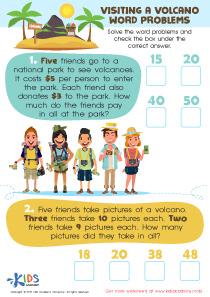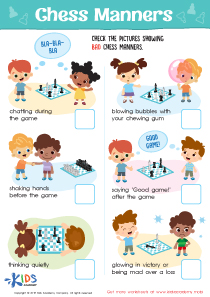Normal Place Value Quizzes for 8-Year-Olds
2 results
2 filtered results
Clear all filters2 filtered results
-
From - To
Dive into the world of numbers with our "Normal Place Value for 8-Year-Olds" interactive assessment quizzes! Designed specifically for young learners, these quizzes make understanding the concept of place value engaging and fun. As children navigate through each question, they will test their knowledge on how numbers are constructed and learn the importance of each digit's position. Instant feedback is provided, reinforcing learning and encouraging improvement. Perfect for 8-year-olds, our quizzes offer a friendly challenge that boosts confidence and enhances mathematical skills. Join us on this educational adventure and master the basics of Normal Place Value today!
Understanding the concept of place value is a foundational skill in mathematics, vital for young learners to grasp in order to excel in their studies. Normal Place Value for 8-Year-Olds is designed specifically with this age group in mind, offering interactive quizzes that engage children in a fun and educational way. These quizzes are not only tailored to the developmental stage and learning capacity of 8-year-olds but also align with educational standards to ensure they are learning valuable skills that will aid them in their academic journey.
The significance of mastering place value at an early age cannot be overstated. It lays the groundwork for all future mathematics learning, including essential skills such as addition, subtraction, multiplication, and division. Furthermore, understanding place value helps children in problem-solving and critical thinking, skills that are beneficial beyond mathematics. The Normal Place Value for 8-Year-Olds quizzes make this learning process enjoyable and accessible, encouraging children to engage with the material and reinforce their knowledge through practice.
One of the key benefits of these interactive quizzes is the instant feedback mechanism. Children receive immediate responses to their answers, allowing them to understand their mistakes and learn the correct concepts in real-time. This immediate reinforcement helps solidify their understanding of place value and boosts their confidence as they see their progress. The quizzes are designed to be challenging yet achievable, striking the right balance to keep children motivated and engaged without feeling overwhelmed.
Furthermore, the Normal Place Value for 8-Year-Olds quizzes incorporate a variety of question formats and difficulty levels, catering to different learning styles and ensuring that all children, regardless of their current understanding of place value, can benefit. From visual aids to word problems, the quizzes are comprehensive and cover all aspects of place value. This variety keeps the learning experience fresh and exciting, encouraging children to continue practicing and improving.
Another advantage of these quizzes is the ability for parents and educators to track progress. This monitoring capability is crucial for identifying areas where a child may need additional support and acknowledging their achievements. It enables adults to provide targeted help, further enhancing the learning experience and ensuring that each child can reach their full potential.
In today's digital age, integrating technology into learning is more important than ever. Normal Place Value for 8-Year-Olds leverages this by offering a digital learning tool that is both educational and entertaining. This approach to learning not only aligns with how children are accustomed to receiving information today but also prepares them for the increasingly digital world they will navigate in the future.
In conclusion, Normal Place Value for 8-Year-Olds interactive quizzes are an invaluable resource for children in their studies. They make learning about place value accessible, engaging, and fun, helping to lay a strong foundation in mathematics. By participating in these quizzes, children can enhance their problem-solving skills, build confidence in their mathematical abilities, and set themselves on a path to academic success.
















